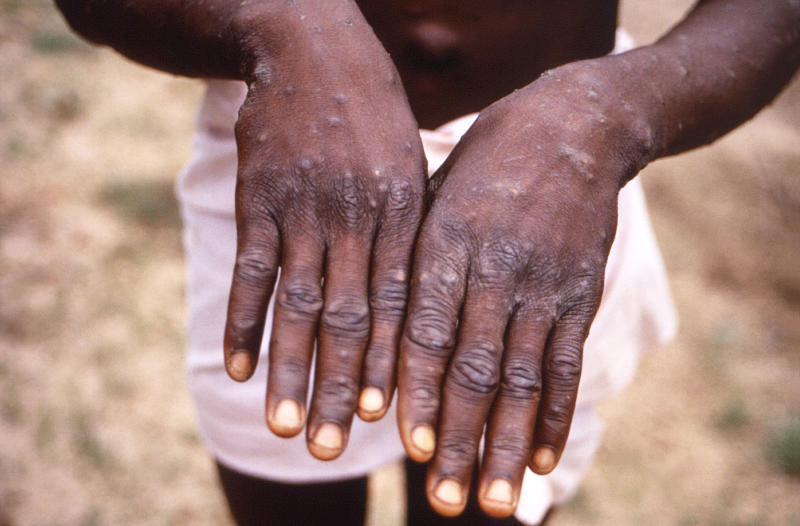Monkeypox case in Singapore: None of those exposed to virus have caught the infection so far
Sign up now: Get ST's newsletters delivered to your inbox

Monkeypox is usually transmitted by infected animals. Human-to-human transmission is less common.
PHOTO: CDC/BRIAN W.J. MAHY
Follow topic:
SINGAPORE - The 23 individuals who had close contact with a Nigerian man diagnosed with monkeypox earlier this month are well and have shown no sign so far of having caught the infection, as of Monday evening (May 13).
They will remain in quarantine up till 21 days from the last time they were in contact with the patient. This is the limit of infection following exposure, although most people who get it would show symptoms between six and 16 days.
Five of the contacts are Singaporeans, who were quarantined at home, while the 17 foreigners were housed individually at a designated quarantine facility, said a spokesman for the Ministry of Health (MOH) on Tuesday. They have Wi-Fi and meals are delivered to them. The remaining foreigner had left Singapore before the original infection was detected. He is also fine.
The MOH told The Straits Times: "Given the public health objectives, the costs incurred from the use of the designated quarantine facility, assessment at NCID, and post-exposure vaccination will be borne by MOH."
The NCID is the National Centre for Infectious Diseases.
The smallpox vaccine can give more than 80 per cent per cent protection against monkeypox if given before, or within four days of exposure. If given between four and 14 days of exposure, it may not prevent infection but may reduce the symptoms of the disease.
The man, who arrived in Singapore on April 28, started showing symptoms of fever, muscle ache, chills and skin rash on April 30 and was diagnosed on May 8. He had spent most of the intervening period in his hotel room. He is recovering at the NCID and is in stable condition.
He had been taken by ambulance to Tan Tock Seng Hospital (TTSH) on May 7, where he was diagnosed with monkeypox - an infection that has been likened to chicken pox or a milder version of smallpox - and was placed in isolation at the NCID.
He told the authorities that he may have contracted the disease after eating bush meat at a wedding in Nigeria.
The ministry then traced all the people he had been in close contact with and had them quarantined - except for one foreign participant who had already left the country. He, too, has shown no signs of having contracted monkeypox.
Most of the people quarantined had been at the workshop and include the trainer and other course participants. The 18 foreigners are from Britain, India, Ireland, Malaysia, Nigeria and Vietnam.
The infection is usually transmitted by infected animals. Human-to-human transmission is less common.
For most people, the disease is self-limiting and patients recover in two to three weeks.
However, in western and central Africa where the disease is usually confined, there has been up to one in 10 deaths during an outbreak, mostly in younger people.
Singapore is the fourth country in the world, and the first in Asia, to have a case of monkeypox. The others are the United States in 2003 and England and Israel last year.
The MOH said it has advised all medical practitioners to remain vigilant against possible imported cases of monkeypox. Healthcare workers have also been advised on the management of the disease.

